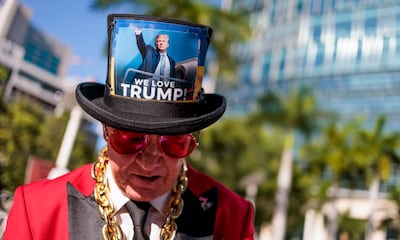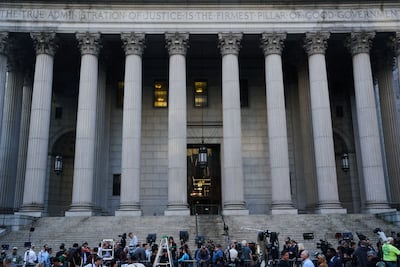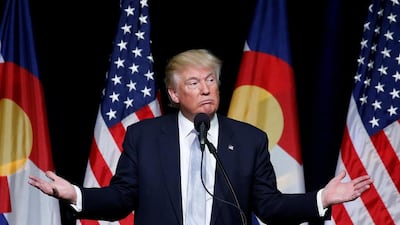Former US President Donald Trump's presidential ambitions and viability have been widely expected to increasingly collide with his legal woes throughout 2024, but that potential train wreck is already gaining speed. 2023 is ending with a pronounced interplay between his political contests and criminal prosecutions.
Mr Trump remains a strong favourite to win a third consecutive Republican nomination, despite an unbroken string of defeats for the former president and his movement in 2018, 2020, 2021, 2022 and, most recently, the 2023 state elections in Kentucky and Virginia. Nonetheless, Republican voters don't seem tired of all this "winning," as he confidently predicted.
Yet, he faces 91 felony charges and numerous damning personal and professional civil liability cases, including two he’s already lost. The first found him liable for sexual assault of a columnist in 1996 that a federal judge ruled amounts to the common meaning of rape, while the second exposed systematic misrepresentation of the value of his business properties in order to defraud New York State.
All that may not have damaged his chances of yet again winning the Republican nomination, but when the broad mass of Americans, who have been largely disengaged since the end of 2000, become aware of these verdicts and other forthcoming decisions that go to the heart of his character, they are unlikely to be more impressed with him than during the aforementioned unbroken string of electoral defeats – his sole victory being his surprise win in the electoral college, although not the popular vote, in 2016.
The insurrection Mr Trump orchestrated on January 6, 2021, in which his supporters violently attacked Congress in an effort to prevent the confirmation of Joe Biden's electoral victory, is finally starting to have potentially devestating practical and political consequences. The insurrection was the culmination of a broader coup plot, including a nefarious "fake electors" scheme, among other alleged unlawful conspiracies that form the heart of Jack Smith's federal indictment in Washington DC (as distinct from Mr Trump's indictment in Florida regarding purloined and hidden top secret government documents the FBI discovered at his hotel).

Last week, the Colorado Supreme Court – not known for its ideological zeal – ruled that a crucial clause in the US Constitution's 14th amendment prevents Mr Trump from seeking or holding federal public office, including the presidency. This means that, unless and until their ruling is overturned, he will not be on the ballot in that state, and unless it is quickly overturned, others will surely follow suit.
The Colorado ruling is likely to prove a highly embarrassing challenge for Republican-nominated justices on the US Supreme Court. The operative clause of the 14th amendment, adopted after the Civil War, was aimed at preventing former Confederate rebels from regaining power. It holds that those who take an oath to defend the Constitution and then participate in an insurrection against it are ineligible for public office. The intention and the plain meaning of the amendment seemed clear, and numerous conservative lawyers have pressed the case for Mr Trump's ineligibility.
That's particularly problematic for the right wing Supreme Court judges, who all claim to be guided by "originalism" or "textualism," meaning they follow the historically-established “original intent” of the framers of the law or its plain and literal meaning according to its text. By both of these standards, Mr Trump plainly did foment an insurrection on January 6 and is therefore constitutionally barred from seeking federal public office.

The main argument against that conclusion isn't that he didn't orchestrate an insurrection – because he plainly did – but rather that the president isn't "an officer of the United States," because he is elected rather than appointed. This is tortured and fatuous. Not only does the president take an oath of office, he or she is the quintessential public officer. If the president isn't a "public officer" then the term has no clearly accessible meaning. As conservative backers of the amendment note, constitutional law thereby becomes reduced to a "secret code" incomprehensible to the public.
It will be fascinating to watch "conservative" justices contort language and logic to ignore the established original intent and the plain meaning of the law to disallow its application to Mr Trump. But, as I've outlined in these pages previously, the Court has become so corrupt and politically compromised that its right-wing majority can be relied upon to betray all of its professed principles at the drop of a hat.
The other crucial case involves Mr Smith's effort to get the Court to rule on Mr Trump's claims of absolute immunity from any criminal prosecution for the coup plot and other serious crimes by claiming they were part of his "official acts" as president and, as he has claimed, "I was doing my duty as President to expose and further investigate a rigged and stolen election."
Mr Trump is making this absurd argument at every possible opportunity, so Mr Smith asked the Supreme Court to act quickly to find, as it inevitably must, it has no merit in either fact or law. It cannot conceivably be the official duty of the President to launch an insurrection, try to overthrow the Constitution, or overturn a fair and valid election outcome. Indeed, those can only be very serious criminal conspiracies, as Mr Smith and other prosecutors allege.
Even the right wing Supreme Court majority won't support Mr Trump on this truly preposterous immunity claim. But they have helped him by refusing Mr Smith's expedited ruling request, making it all the more likely there won't be a conclusion to this case before the November election, though that's still possible.
Mr Trump may or may not be a convicted felon before the vote, but his vast record of wrongdoing will be in the public record and a key feature of the election.
It's not too late for Republicans to dump him. A recent poll shows former South Carolina governor Nikki Haley within four points of the former president in the first primary state, New Hampshire. If she were to win there, or even come a close second, his candidacy could conceivably unravel, leaving Mr Biden to face a far more viable Republican opponent.
But that still seems very unlikely. Despite the 14th amendment, Mr Trump is likely to be on the ballot in every state as the Republican candidate. And that's the best possible news for Mr Biden.


